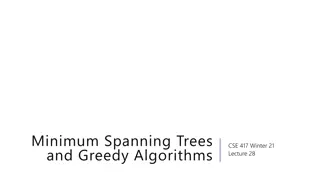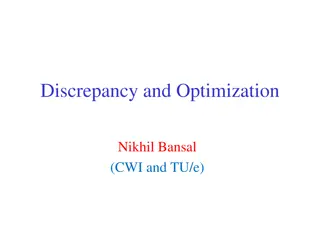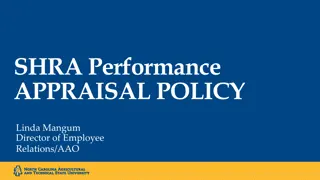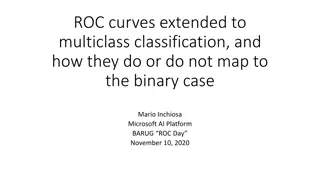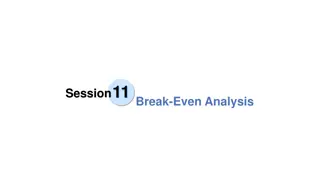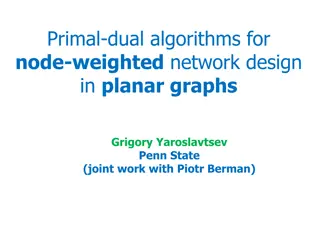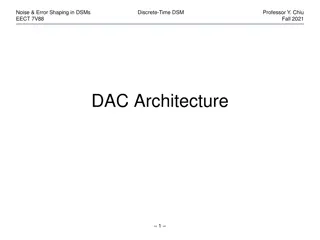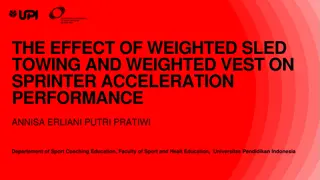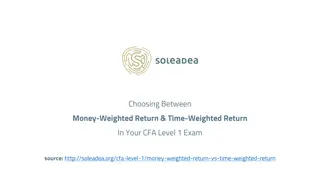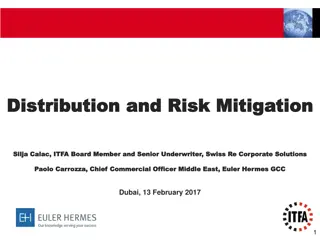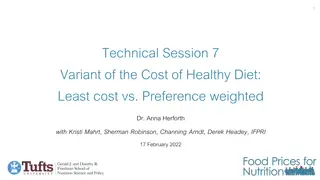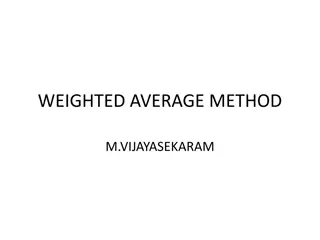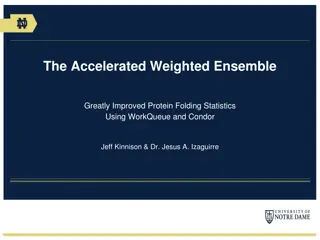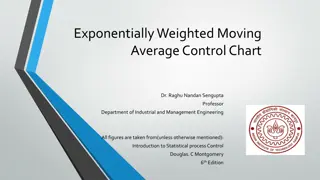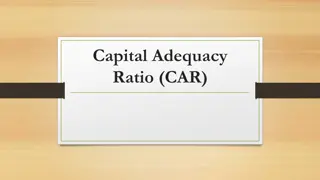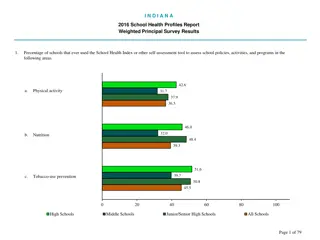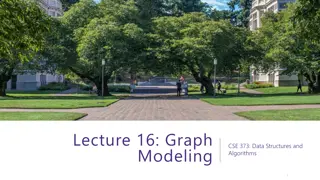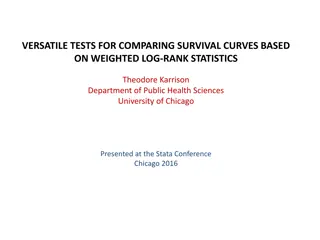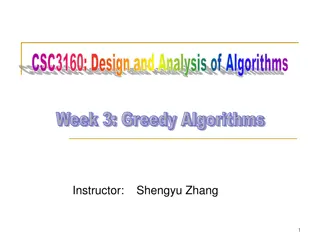Rise to the Challenge with Honors, AP, and Dual
Early Postsecondary Opportunities (EPSOs) that allow high school students to earn college credits or industry certifications. Become a Ready Graduate and achieve educational milestones. Understand how weighted grades work in Honors, EPSO, and AP classes.
1 views • 17 slides
Optimal Capital Structure and Value Maximization in Traditional Approach
The traditional approach to finance emphasizes achieving the optimal capital structure by balancing debt and equity to minimize the Weighted Average Cost of Capital (WACC) and maximize the firm's overall value. By understanding the relationship between the cost of debt and equity, financial leverage
4 views • 6 slides
Understanding Diffusion Weighted Imaging (DWI) in Neuroimaging Research
This content delves into the significance of Diffusion Weighted Imaging (DWI) in studying the motion of water molecules in brain tissue. It explains how water diffusion varies in different brain matter types and explores techniques like Diffusion Tensor Imaging (DTI). The impact factors on diffusion
4 views • 25 slides
Understanding Greedy Algorithms and Minimum Spanning Trees
Greedy algorithms build solutions by considering objects one at a time using simple rules, while Minimum Spanning Trees find the most cost-effective way to connect vertices in a weighted graph. Greedy algorithms can be powerful, but their correctness relies on subtle proofs and careful implementatio
6 views • 61 slides
Understanding Binary Codes and Their Applications
Binary coding is crucial for digital systems as they understand only 0s and 1s. This process converts information into binary language for processing by digital circuits. Different types of binary codes like weighted codes and BCD codes are used for error correction, digital communication, and compu
7 views • 20 slides
Understanding the Rule of Mixtures in Composite Materials
The Rule of Mixtures (ROM) is a weighted method for predicting the properties of composite materials, such as fiber-reinforced polymers (FRP). This method relies on assumptions regarding the homogeneity and properties of fibers and matrices. By combining volume fraction and properties linearly, the
5 views • 23 slides
Understanding Non-Weighted Codes and Excess-3 Code in Binary Systems
Explore non-weighted binary codes like Excess-3 code, learn how to convert decimal numbers to XS-3 code, advantages and disadvantages of BCD codes, and steps to convert Excess-3 code to binary. Discover the intricacies of binary coding systems with practical examples.
5 views • 55 slides
Design and Implementation of Pilot of a TVET Renewable Energy Course
This module delves into the essential concepts of racking and mounting PV panels in renewable energy systems. It covers different types of mounting approaches such as roof, ground, pole, weighted (ballast), and tracking installations, providing insights into the diverse applications and benefits of
2 views • 42 slides
Student-Centered Budgeting for School Funding
Different Weighted Models for Budgeting in Student-Centered Budgeting aim to ensure fair allocation of resources by considering student needs beyond just enrollment numbers. Ground rules and parameters are set to protect school funding and align budget methodologies with district priorities. The foc
0 views • 18 slides
Understanding Your GPA: Weighted vs. Unweighted, College Admission, and Scholarships
GPA, or Grade Point Average, plays a crucial role in college admission and scholarship opportunities. Understanding the difference between weighted and unweighted GPAs is essential. Weighted GPAs give more weight to advanced classes like AP and Dual Enrollment, impacting your overall GPA calculation
0 views • 11 slides
Understanding Discrepancy and Optimization in Mathematical Analysis
Discrepancy and Optimization, explored by Nikhil Bansal, delve into irregularities when approximating continuous data with discrete points. This concept addresses the challenge of distributing points uniformly in a grid and optimizing numerical integration or sampling techniques. Additionally, it to
0 views • 22 slides
SHRA Performance Appraisal Policy Guidelines
The SHRA Performance Appraisal Policy outlines the performance cycle, expectations, responsibilities, calibration sessions, setting of expectations, weighted goals, and more. Employees are encouraged to actively participate, ask questions, and keep supervisors informed. Supervisors are expected to p
0 views • 39 slides
The Law-Gold model
Explore the intricate workings of sensory representation, individual neuron modeling, interneuron correlations, decision variable construction, and reinforcement learning in neuronal populations. Gain insights into how neuronal responses are pooled to form decision variables used for creating weight
1 views • 18 slides
Understanding ROC Curves in Multiclass Classification
ROC curves are extended to multiclass classification to evaluate the performance of models in scenarios such as binary, multiclass, and multilabel classifications. Different metrics such as True Positive Rate (TPR), False Positive Rate (FPR), macro, weighted, and micro averages are used to analyze t
3 views • 8 slides
Understanding Break-Even Analysis and CVP Formulas
Dive into the world of break-even analysis and cost-volume-profit formulas to analyze business profitability. Learn about breakeven revenue, contribution/sales ratio, weighted average C/S ratio, and more through practical examples. Explore the significance of break-even charts and profit-volume char
0 views • 11 slides
Primal-Dual Algorithms for Node-Weighted Network Design in Planar Graphs
This research explores primal-dual algorithms for node-weighted network design in planar graphs, focusing on feedback vertex set problems, flavors and toppings of FVS, FVS in general graphs, and FVS in planar graphs. The study delves into NP-hard problems, approximation algorithms, and previous rela
0 views • 17 slides
Understanding Behavioral Objectives in Education
Behavioral objectives in education are essential for effective teaching and learning. They provide clear direction on what students will achieve and how teachers can facilitate that learning. Different types of objectives, such as general and specific objectives, help in structuring educational goal
2 views • 13 slides
Understanding Weighted Moving Average Charts for Process Monitoring
Weighted moving average charts are powerful tools for detecting small shifts and trends in process means. By utilizing Uniformly Weighted Moving Average (UWMA) charts and Exponentially Weighted Moving Average (EWMA) charts, organizations can monitor and identify changes in process means with precisi
1 views • 29 slides
Noise & Error Shaping in Discrete-Time DSMs EECT 7V88 - Fall 2021
Explore the intricacies of noise and error shaping in DSMs with Professor Y. Chiu's course on Discrete-Time DSMs for EECT 7V88 in Fall 2021. Delve into DAC architectures including Nyquist, binary-weighted, and more. Learn about Binary-Weighted CR DAC, CP Cu, capacitor arrays, gain errors, nonlineari
1 views • 30 slides
Understanding the Cost of Capital in Finance
The cost of capital is crucial for businesses to determine the average cost of their finance. The Weighted Average Cost of Capital (WACC) is used as a discount rate in financial calculations. It involves estimating the cost of each source of finance and calculating a weighted average. Additionally,
0 views • 14 slides
Understanding Weighted Price Indices in Economics
Weighted price indices are essential in economics to measure changes in prices over time. Different methods such as Laspeyre's and Paasche's price indices offer ways to calculate these indices using weighted averages. Fisher's index combines both methods to provide a comprehensive view. The weighted
3 views • 9 slides
Sewing Club Making Weighted Bibs for Infants at MUSC Children's Hospital
Our Buist Sewing Club, inspired by the unity during the Bosnian War, creates weighted bibs for infants at MUSC Children's Hospital. These bibs provide comfort and aid in circulation post-surgery, benefitting over 137,000 children annually. Through our diverse group, we aim to make a positive impact
0 views • 15 slides
Understanding School Finance: Key Funding Sources and Weighted Funding
Explore the differences in funding between charter schools and traditional ISDs, sources of funding in charter school systems, the impact of attendance on budget allocation, challenges in the Texas school finance system, and the future outlook for charter school funding amidst potential changes. Del
1 views • 90 slides
Effect of Weighted Sled Towing and Weighted Vest on Sprinter Acceleration Performance
Short distance running involves crucial phases affecting sprint performance, with acceleration being particularly important. Training methods like weighted sled towing and weighted vest usage have been found effective in enhancing sprint acceleration. This study investigated the impact of these meth
0 views • 8 slides
Choosing Between Money-Weighted Return & Time-Weighted Return in CFA Level 1 Exam
Learn the differences and implications of Money-Weighted Return (MWRR) and Time-Weighted Return (TWRR) for your CFA Level 1 exam. Understand how to calculate these returns, their characteristics, and when each method is appropriate. Clear your calculator before computations, and remember the key tip
0 views • 12 slides
Risk Mitigation and Distribution in Trade Finance
Silja Calac and Paolo Carrozza discuss regulatory capital requirements, risk mitigation strategies in trade finance, and the impact of credit risk insurance on weighted assets. The comparison tables illustrate the benefits of insurance in reducing risk-weighted assets and regulatory capital.
0 views • 14 slides
Effective Management of Public Health Incidents: Objectives and Team Leadership
Learn the importance of distinguishing between management objectives and incident objectives, linking objectives to response activities, and leading an Incident Management Team through the Planning P process. Explore the difference between general management objectives and operational incident objec
0 views • 28 slides
Understanding Cost Variants in Healthy Diets: Least Cost vs Preference Weighted
The discussion delves into the concept of least-cost versus preference-weighted healthy diets, highlighting the differences in cost and food selection. It explores how preference weighting takes into account food preferences of low-income consumers, providing insights into the affordability and cult
0 views • 18 slides
Understanding Weighted Average Cost Method in Accounting
The weighted average cost method is a crucial approach in valuing inventory for businesses. It calculates the average cost of all inventory items based on individual costs and quantities held in stock. By dividing the cost of goods available for sale by the number of units available, this method det
0 views • 5 slides
Accelerated Weighted Ensemble for Improved Protein Folding Statistics
The Accelerated Weighted Ensemble (AWE) approach addresses the challenges faced by traditional molecular dynamics (MD) simulations in generating statistically significant kinetic data for protein folding. By utilizing methods such as WorkQueue and Condor, AWE enhances efficiency and accuracy in stud
0 views • 14 slides
Understanding Exponentially Weighted Moving Average Control Charts
Exponentially Weighted Moving Average (EWMA) control charts offer an effective alternative to Shewhart control charts for detecting small shifts in processes. This article explores the definition, properties, and calculations involved in EWMA control charts, providing insights on using this method i
0 views • 28 slides
Understanding Capital Adequacy Ratio (CAR) in Banking
Capital Adequacy Ratio (CAR) is a crucial metric in banking that measures a bank's capital against its risk. Also known as CRAR, it enhances depositor protection and financial system stability worldwide. The CAR formula involves dividing a bank's capital by its risk-weighted assets, comprising tier
0 views • 7 slides
Strategic Mechanism Design in Decision-making
Explore the concept of mechanism design with strategic mediators optimizing global objectives and welfare. Learn about facility location on a line, dominant strategies, two-sided incentive compatibility, and the weighted median of medians.
0 views • 14 slides
I.N.D.I.A.N.A. 2016 School Health Profiles Report: Survey Results and Improvement Planning
The I.N.D.I.A.N.A. 2016 School Health Profiles Report presents weighted principal survey results on school health assessments and improvement planning. It explores the use of self-assessment tools, school policies, health-related objectives in School Improvement Plans, and the review of health and s
0 views • 79 slides
Systematic Design Evaluation and Optimization Methods
This content covers various structured design methods such as the V Model of Systems Engineering, Pugh Analysis, Weighted Objectives Method, and Ranking and Weighting Objectives. It also discusses the process of recognition, generation, evaluation, and optimization of design alternatives, along with
0 views • 15 slides
Graph Modeling in Data Structures and Algorithms
Exploring graph modeling in CSE 373, this lecture covers topics such as using BFS for finding shortest paths, limitations of BFS on weighted graphs, and the introduction of Dijkstra's algorithm for weighted graphs. It emphasizes the importance of considering edge weights in determining traversal ord
0 views • 29 slides
Versatile Tests for Comparing Survival Curves Based on Weighted Log-Rank Statistics
Overview of various statistical tests for comparing survival curves beyond the traditional log-rank test. The focus is on weighted log-rank statistics sensitive to non-proportional hazards scenarios, with examples and methodologies discussed. These tests aim to provide more nuanced insights into dif
0 views • 31 slides
Greedy Algorithms: Minimum Spanning Tree Analysis
Explore the concept of Minimum Spanning Tree (MST) in the context of greedy algorithms, focusing on Kruskal's Algorithm. Understand the methodology behind selecting the minimum weighted subgraph that connects all vertices in a weighted graph efficiently. Delve into problem-solving strategies and app
0 views • 39 slides
Understanding Dijkstra's Algorithm for Shortest Paths with Weighted Graphs
Dijkstra's Algorithm, named after inventor Edsger Dijkstra, is a fundamental concept in computer science for finding the shortest path in weighted graphs. By growing a set of nodes with computed shortest distances and efficiently using a priority queue, the algorithm adapts BFS to handle edge weight
0 views • 30 slides
Anytime Weighted MaxSAT with Improved Polarity Selection and Bit-Vector Optimization
Weighted MaxSAT is a optimization problem where targets are assigned weights and hard clauses must be satisfied. The goal is to find a model that maximizes the overall weight of satisfied target bits. The formulation involves unit clauses associated with integer weights, with a focus on improving po
0 views • 49 slides



